Table of Contents
The Mediterranean diet is one of the world’s most popular diets. It is well-renowned for its numerous health benefits. What’s more, it’s adaptable and easy to follow. Enjoy a culinary journey with our 7-day Mediterranean diet meal plan and learn how to make this healthful way of eating work for you. We include a useful food pyramid, tips for first-timers, and advice on restrictions and potential nutrient gaps.
What is the Mediterranean diet?
The Mediterranean diet and lifestyle originated from Greece, Southern Spain, Italy, and other regions around the Mediterranean Sea. The populations in these countries are known for their lower risk of metabolic and cardiovascular diseases (1).
The Mediterranean diet emphasizes whole foods and mindful eating. The key health benefits lie in its plant-based foods, a focus on healthy fats, including omega-3 fats and whole grains. This diet also suggests limiting sugar, refined grains, and highly processed foods (2).
A healthy lifestyle is a part of the Mediterranean-style diet. It promotes regular physical activity, social interaction, and plentiful rest (2). This way, you can effectively maintain both your physical and mental well-being.
Mediterranean diet food pyramid
To simplify your meal planning, there’s a visual guide known as the Mediterranean diet food pyramid. You can use this pictorial guide for choosing the right foods and in the correct proportions for balanced nutrition (2, 3).
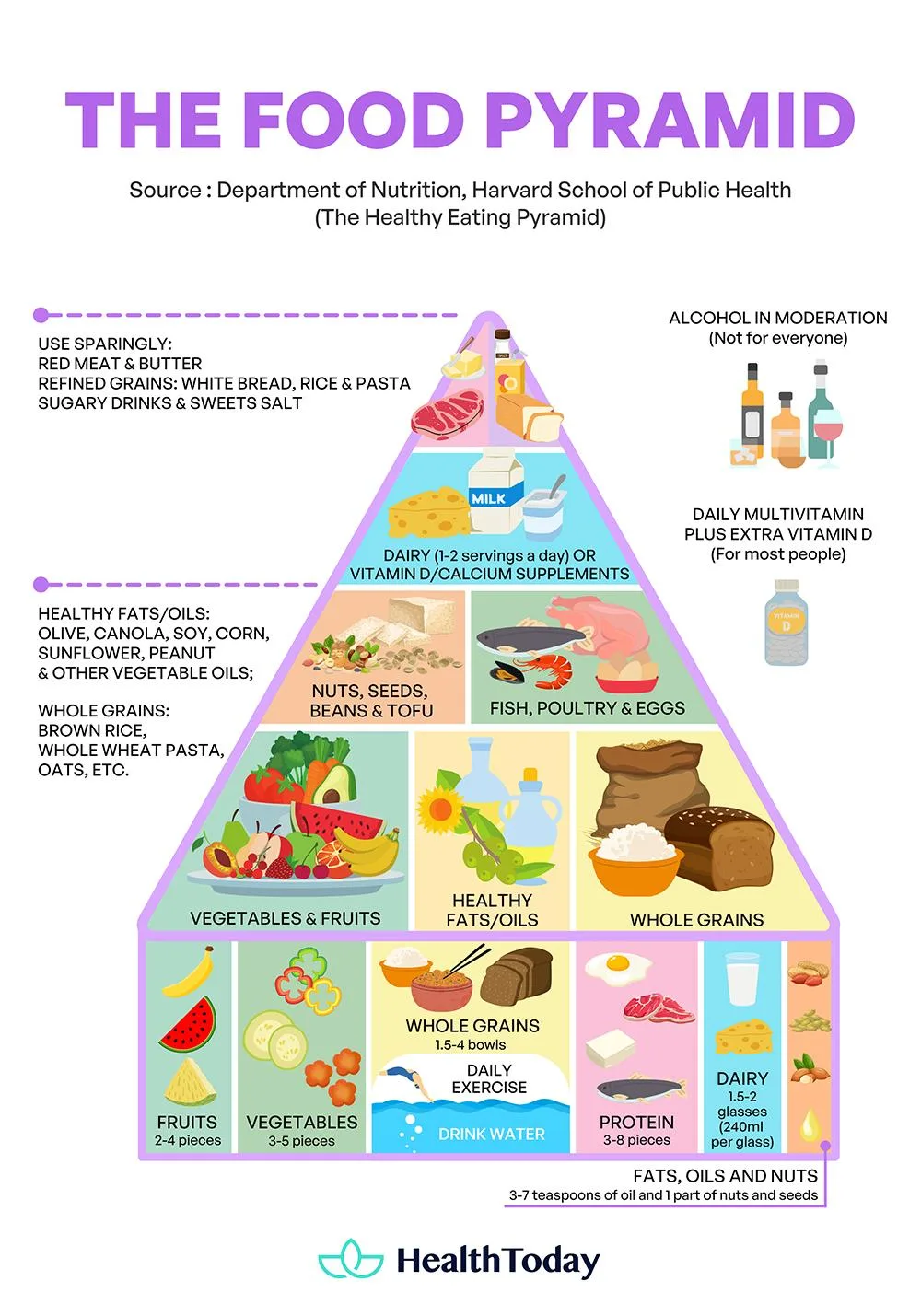
Here are the recommended servings for fresh produce or plant-based foods:
- Vegetables – at least two servings a day, one taken raw.
- Fruits – one to two servings per meal.
- Whole grain cereals – one to two servings per meal.
- Nuts and seeds – one to two servings per day.
- Extra virgin olive oil – two to four tablespoons per day.
- Legumes – more than two servings per week.
Meat, dairy, eggs, and seafood are generally included in moderation, and the focus is lean cuts with red meats:
- Red meats – less than two servings per week, preferably lean cuts.
- Dairy products – no more than two servings per day, preferably low-fat.
- White meats – two servings per week.
- Eggs – two to four servings of eggs per week.
- Fish and seafood – two or more servings per week.
The Mediterranean diet recommends keeping well-hydrated and includes a moderate consumption of red wine. Sugary and processed foods are for special occasions:
- Water – 1.5 to 2 liters of water per day
- Red wine – one glass per day for women and two for men.
- Others – sweets, sweetened beverages, highly processed food in small amounts occasionally.
Tips for first-timers
A healthy meal plan for beginners can help you get ahead with shopping and meal preparation. To simplify the process, prioritize full meals with natural ingredients. You should also include a wide range of foods taken from each food group.
Mastering portion control is essential to avoid overeating.
A helpful trick is to use smaller dishes or bowls. Dedicate half of the space to veggies, leaving the other half for other ingredients. This method helps in portion control, particularly for higher-calorie foods.
7 Day Mediterranean diet culinary
Following a Mediterranean diet can sometimes be difficult for first-timers. To make it easier, you can use this 7-day Mediterranean diet meal plan guide:
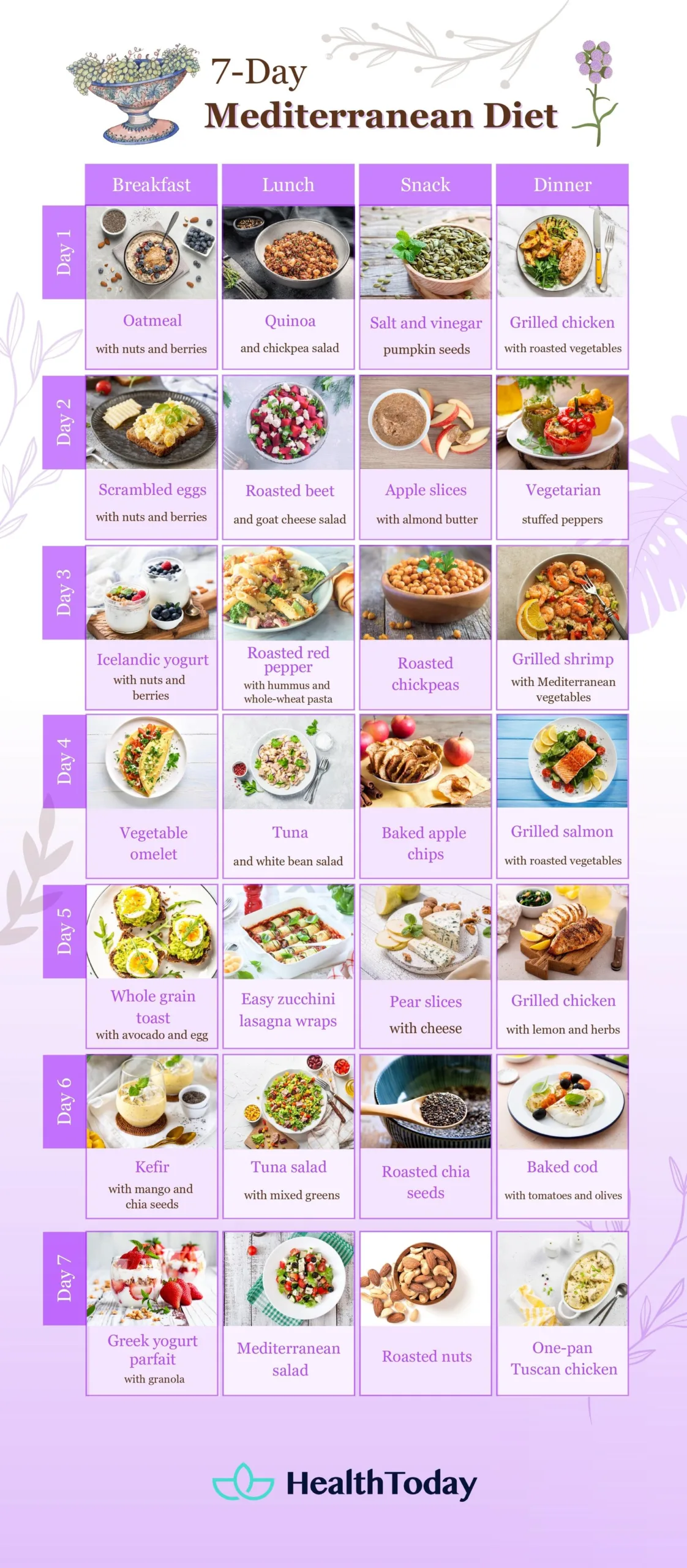
Grab your meal plan today and enjoy a week of Mediterranean goodness!
Day 1
- Breakfast: Oatmeal with nuts and berries
- Lunch: Quinoa and chickpea salad
- Snack: Salt and vinegar pumpkin seeds
- Dinner: Grilled chicken with roasted vegetables
Day 2
- Breakfast: Scrambled eggs with whole-grain toast
- Lunch: Roasted beet and goat cheese salad
- Snack: Apple slices with almond butter
- Dinner: Vegetarian stuffed peppers
Day 3
- Breakfast: Icelandic yogurt with berries and almonds
- Lunch: Roasted red pepper with hummus and whole-wheat pasta
- Snack: Roasted chickpeas
- Dinner: Grilled shrimp with Mediterranean vegetables
Day 4
- Breakfast: Vegetable omelet
- Lunch: Tuna and white bean salad
- Snack: Baked apple chips
- Dinner: Grilled salmon with roasted vegetables
Day 5
- Breakfast: Whole grain toast with avocado and egg
- Lunch: Easy zucchini lasagna wraps
- Snack: Pear slices with cheese
- Dinner: Grilled chicken with lemon and herbs
Day 6
- Breakfast: Kefir with mango and chia seeds
- Lunch: Tuna salad with mixed greens
- Snack: Roasted chia seeds
- Dinner: Baked cod with tomatoes and olives
Day 7
- Breakfast: Greek yogurt parfait with granola
- Lunch: Mediterranean salad
- Snack: Roasted nuts
- Dinner: One-pan Tuscan chicken
How to tailor the Mediterranean diet
The Mediterranean diet meal plan is fortunately not a one-size-fits-all solution. There is a wide range of food groups to work with, and you can tweak it to regional or personal preferences, including dining out.
Mediterranean diet shopping list
When shopping for a Mediterranean diet, prioritize fresh and whole foods. Choose a mix of various ingredients and limit highly processed foods. To stay focused, create a shopping list according to your meal plan.
Here is a handy shopping list for the best Mediterranean diet foods:
- Fruits – apples, berries, oranges, bananas, grapes.
- Vegetables – tomatoes, eggplants, spinach, kale, zucchini.
- Whole grains – whole wheat bread, brown rice, oats, quinoa.
- Lean proteins – salmon, skinless chicken breast, mackerel.
- Legumes – black beans, kidney beans, tempeh, chickpeas.
- Healthy fats – extra virgin olive oil, avocados, olives, and chia seeds.
- Dairy products – Greek yogurt, feta cheese, low-fat milk.
- Herbs and spices – basil, rosemary, thyme, garlic, turmeric, cinnamon.
Dining out the Mediterranean
Eating out on a Mediterranean diet simply means making mindful choices. Choose either chicken, fish, or other seafood as your main course. Include vegetables and ask if your dish can be prepared with olive oil.
While it’s suggested to pair red wine with meals in moderation, it’s crucial to avoid excessive wine consumption. Water or unsweetened beverages are the best choice. For dessert, fresh fruit is a great option. It’s best to save sweets for special occasions.
Mediterranean diet meal plan fine points
The Mediterranean diet is widely regarded as a healthy eating pattern that also supports weight loss. However, it is important to be aware of pitfalls with meal planning. These will help you succeed in creating a healthier, balanced lifestyle.
Macronutrient balance
A well-balanced macronutrient profile is key to your Mediterranean diet meal planning.
Protein, healthy fats, and carbohydrates are all essential macronutrients for maintaining overall health. Their correct balance will ensure optimal energy levels, support for bodily functions, and sufficient satiety (4, 5).
Consuming the wrong amounts of each macronutrient can be problematic. Too much protein may potentially strain the kidneys and lead to calcium imbalances (6, 7). Conversely, too little protein can hinder muscle repair and growth (8, 9).
Eating too much fat, especially saturated ‘unhealthy’ fat, can contribute to weight gain and a higher risk of cardiovascular disease (10, 11).
However, low fat intake may affect the absorption of fat-soluble vitamins like vitamins A, D, E, and K (12). Insufficient essential fatty acids, like omega 3 and omega 6, might cause neurological problems and stunted growth (13).
Lastly, carbohydrates are a valuable source of energy. However, overeating carbohydrates may lead to weight gain and blood sugar imbalances (14). On the other hand, if you don’t get enough carbohydrates, you could feel fatigue or impair cognitive function (15, 16).
Allergies and food restrictions
Dealing with allergies or non-meat alternatives can be challenging in the Mediterranean diet. Fortunately, the diet is flexible enough to get around most restrictions.
Here are some alternatives for common food restrictions:
Gluten-free: Choose brown rice, quinoa, and millet instead of wheat-based products.
Lactose-free: Soy milk, oat milk, or almond milk can be great alternatives. Try other non-dairy foods like nut-based cheeses or tofu-based yogurt.
Vegetarian and vegan: Beans, tempeh, and tofu are good protein sources.
Nut allergies: Quinoa, kidney beans, and seeds can be good substitutes
Nutrient deficiencies
The Mediterranean diet is generally a nutrient-rich eating pattern. However, there is still potential for certain nutrient deficiencies. Not including a variety of foods can increase the risk of nutritional gaps.
Although the findings remain unclear, some studies suggest the Mediterranean diet may not provide sufficient amounts of vitamin D (17), while others show those using the Mediterranean Diet have a higher intake of Vitamin D (18, 19). This is due to the limited intake of dairy products and eggs in the diet (20).
Some also think that the limitation of red meat in the Mediterranean diet might lead to low iron levels (21). But, one study at least has shown no relation between the Mediterranean diet and iron status (22).
In general, it’s advisable to include a variety of fresh fruit, vegetables, and legumes, whole grains like whole grain bread, healthy fats, and lean proteins. If you have dietary restrictions, it’s better to consult a professional dietitian to help with your meal plans.
Sustainability concerns
It’s important to ensure that your Mediterranean diet meal plans are sustainable for the long term. The key is to be flexible and to focus on a variety of tasteful foods.
An unsustainable meal plan results from too many restrictions or reliance on expensive and hard-to-find ingredients.
You should research local and seasonal ingredients and base your meal planning around this. It’s also a good idea to take food pricing and proper budgeting into account.
What are the main components of the Mediterranean diet?
The main components of the Mediterranean diet include abundant plant-based foods and healthy fats like olive oil. Dairy products, Greek yogurt, poultry, and red wine are had in moderation, while red meat is limited.
Can I include meat and dairy in the Mediterranean diet?
Yes, the Mediterranean Diet allows moderate consumption of lean meats, such as fish and poultry. Dairy products like Greek yogurt and cheese are also in moderation, but preferably low-fat.
How can I get enough protein on the Mediterranean diet?
To meet your protein needs in the Mediterranean diet, incorporate a variety of protein-rich foods. Animal-based protein sources include fish, seafood, poultry, eggs, and Greek yogurt. Don’t forget that plant-based sources include legumes, nuts, and seeds.
Can the Mediterranean diet help me lose weight?
The Mediterranean Diet is proven effective for weight loss. This is due to its emphasis on whole, nutrient-dense foods, portion control, and a focus on a healthy lifestyle. It promotes sustainable and balanced eating habits.
Can I customize the Mediterranean diet meal plan?
Yes, the Mediterranean diet can be modified to suit various dietary restrictions and individual needs. There are alternatives for gluten-free, lactose-free, vegetarian, vegan, nut allergies, and some other options.
Summary
The Mediterranean diet is a beginner-friendly diet that develops healthy eating habits with numerous health benefits. It emphasizes whole and fresh foods like fresh fruit, vegetables, whole grains, lean proteins, and healthy fats. In contrast, red meat, processed foods, and added sugars are limited. The diet can be easily adjusted to cater to individual needs. It’s a simple and enjoyable way to ensure optimal well-being.






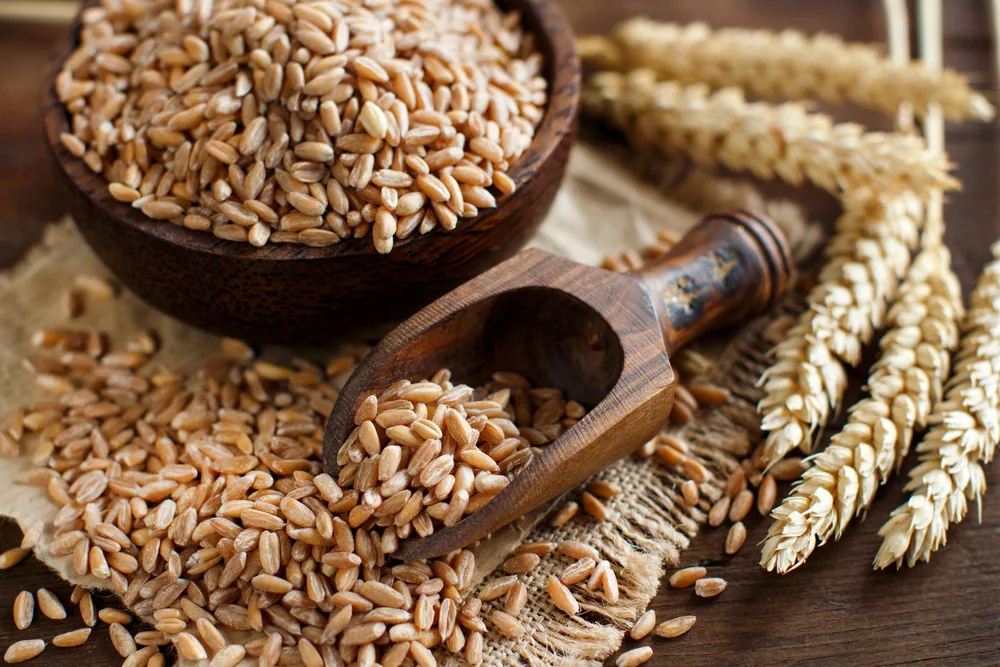



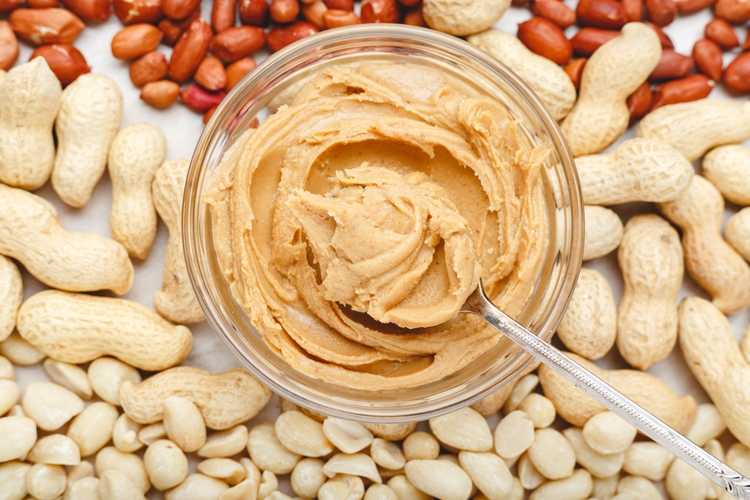
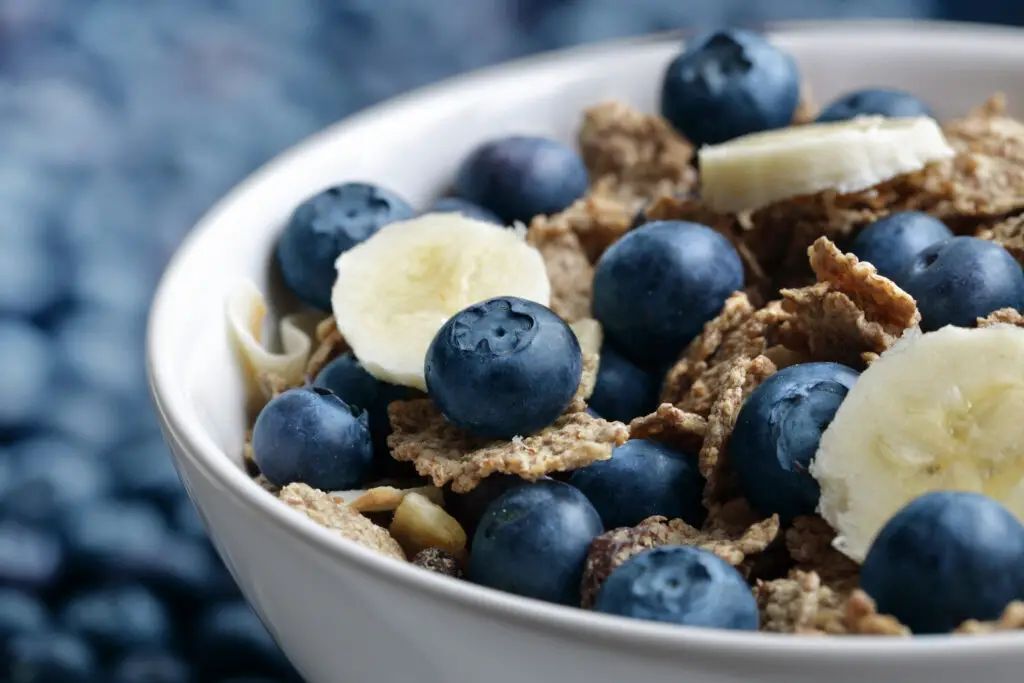





Comments
0